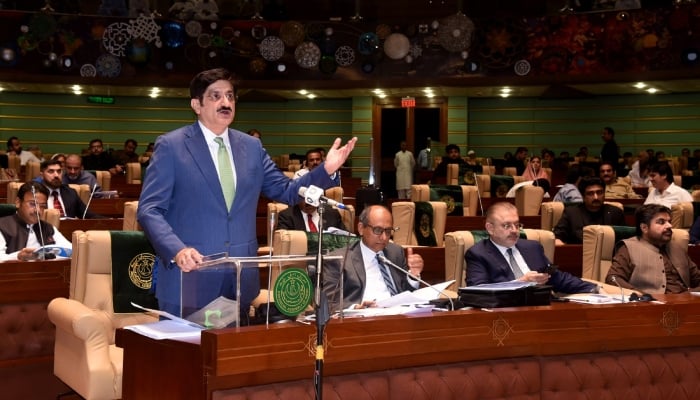Education gets lion's share of Sindh's Rs3 trillion budget 2024-25
Provincial budget presented by CM Murad Ali Shah proposes massive hike in salaries of govt employees
The Sindh government has allocated the largest amount of funds, Rs519 billion for the education sector in the Rs3.056 trillion budget for the next fiscal year 2024-25, presented by Chief Minister Murad Ali Shah on Friday.
Besides a massive hike of up to 30% in the salaries of government employees, the provincial budget also includes a significantly higher development expense of Rs959 billion accounting for 31% of the outlay.
The "balanced" budget mainly centres around the rehabilitation of flood-affected people and social protection for the poor. The majority of the total projected revenue for the province comes from the 62% federal transfers, followed by 22% provincial receipts.
As per the budgetary document released by the provincial government, the remaining receipts are through current capital receipts of Rs22 billion, foreign project assistance of Rs334 billion, other federal grants in the form of Public Sector Development Programme's (PSDP) Rs77 billion, foreign grants of Rs6 billion and a carryover cash balance of Rs55 billion.
Provincial receipts of Rs662 billion comprise sales tax on services of Rs350 billion, tax excluding GST of Rs269 billion, and provincial non-tax receipts of Rs42.9 billion.
These funds are strategically allocated; a total of 63% or Rs1.9 trillion goes towards current revenue, 6% or Rs184 billion for current capital, and the remaining 31% or Rs959 billion is dedicated to the development expenditure.
Sector-wise allocation
Education receives the largest allocation at Rs519 billion, with R459 billion dedicated to current revenue expenditure.
Healthcare follows closely with a total allocation of Rs334 billion, with Rs302 billion earmarked for current expenses.
Local government rounds out the top three with a proposed budget of Rs329 billion.
Rs58 billion have been allocated for agriculture, Rs77 billion for energy, Rs94 billion for irrigation, Rs86 billion for Works & Services, and Rs30 billion for Planning & Development.
Relief Measures
The provincial budget prioritises social and economic well-being, particularly in the wake of recent floods. This comprehensive approach incorporates several key relief measures:
Minimum Wage: Additionally, a minimum wage increase of Rs37,000 has been proposed.
Social Investment: A significant allocation of Rs34.9 billion targets pro-poor initiatives, directly assisting vulnerable populations.
Subsidy Programs: The budget includes Rs116 billion in subsidies to ease the financial burden on citizens.
Housing Focus: A dedicated Rs25 billion will be directed towards housing schemes, promoting access to safe and secure shelter.
This multi-faceted approach reflects the government's commitment to strengthening the province's social safety net and fostering economic recovery.
New Initiatives
The provincial budget extends its focus beyond immediate relief measures. Several new initiatives target the long-term development of the province's economy and social well-being.
Hari Card: An allocation of Rs8 billion will provide financial support to 12 million farmers, bolstering the agricultural backbone of Sindh.
Inclusive Enclave: Rs5 billion allocations to build a complex to offer education, rehabilitation, training, accommodation, clinical services, recreation and other facilities within a compound at Korangi along the Malir Expressway.
Fiscal Decentralisation in Police: For the first time 485 police station-specific budget has been allocated to enable them to meet their fuel, repair and maintenance, and day-to-day expenditures to serve communities.
Solarisation Initiative: Another Rs5 billion will be directed towards distributing solar home systems, and promoting clean energy access over five years
Hub Canal Project: A dedicated Rs5 billion will fund the construction of a new canal to provide water to Karachi.
Mazdoor Card: A Rs5 billion welfare program will provide support for labourers in Sindh.
Pro-Poor Initiatives: To ensure social upward mobility, the budget allocates Rs11 billion to agriculture and Rs12 billion for social protection.
Meanwhile, another Rs3.2 billion has been allocated for Universities & Board, Rs2 billion for Housing & Town Planning, and Rs1.5 billion for the Department of Empowerment of Persons with Disabilities (DEPD).
Grants in aid
The provincial budget prioritises investment in human capital through significant grants for education and healthcare. Major grants amount to a total of Rs190 billion, with Rs35 billion specifically earmarked for universities across Sindh.
These grants will also support major hospitals and medical institutes like Sindh Institute of Urology and Transplantation (SIUT), National Institute of Cardiovascular Diseases (NICVD), Indus Hospital, Sindh Institute of Child Health & Neonatology (SICHN) and trauma centres.
This targeted funding aims to strengthen educational institutions and improve access to quality healthcare services for the people of Sindh.
-
Security forces gun down 30 terrorists in multiple IBOs in KP: ISPR
-
MQM-P calls for new province in Sindh
-
US report validates Pakistan military edge over India: PM
-
Banned TTP poses serious threat to Pakistan security: UNSC panel
-
CM Afridi clarifies remarks on by-poll after ECP requests army deployment
-
Dubai sees 3.2m Pakistani passengers in 2025 as airport sets new milestone
-
Security forces kill 23 Indian proxy terrorists in KP's Kurram
-
Pakistan to construct island to boost oil exploration: report












